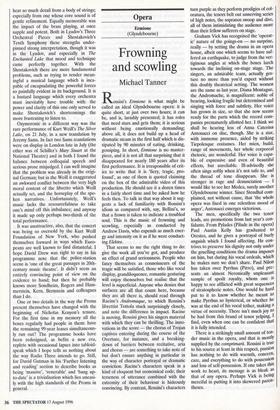Opera
Ermione (Glyndebourne)
Frowning and scowling
Michael Tanner
Rossini's Ermione is what might be called an ideal Glyndebourne opera: it is quite short, at just over two hours; it can be, and is, lavishly presented; it has roles that need stars and gets them; it is serious without being emotionally demanding; above all, it does not build up a head of dramatic steam in the first half which is dis- sipated by 90 minutes of eating, drinking, gossiping. In short, Ermione is no master- piece, and it is not all that surprising that it disappeared for nearly 180 years after its first performance. It is irresponsible of crit- ics to write that it is 'fiery, tragic, pro- found', as one of them is quoted claiming on the box of the admirable video of this production. He should see it a dozen times in a fairly short time and be asked how he feels then. To talk in that way about it sug- gests a lack of familiarity with Rossini's idiom as compared with, say, Bellini's, so that a frown is taken to indicate a troubled soul. This is the music of frowning and scowling, especially as conducted by Andrew Davis, who expends as much ener- gy and intensity on it as if he were conduct- ing Elelara.
That seems to me the right thing to do: give the work all you've got, and produce an effect of grand seriousness. People who fancy themselves as connoisseurs of the tragic will be satisfied, those who like vocal display, grandiloquence, romantic gesturing will enjoy themselves but realise that the level is superficial. Anyone who denies that surfaces are all that count here, because they are all there is, should read through Racine's Andromaque, to which Rossini's librettist Tottola stuck surprisingly closely, and note the difference in impact. Racine is moving, Rossini gives his singers material with which they can be thrilling. The inno- vations in the score — the chorus of Trojan captives entering during the course of the Overture, for instance, and a breaking- down of barriers between recitative, aria and chorus — are something to take note of but don't ensure anything in particular in the way of character portrayal or dramatic conviction. Racine's characters speak in a kind of eloquent but economical code; their terseness of utterance combined with the extremity of their behaviour is hideously convincing. By contrast, Rossini's characters
turn purple as they perform prodigies of col- oratura, the tenors belt out unnerving series of high notes, the sopranos swoop and dive, all of them intimidating the audience more than their fellow sufferers on stage.
Graham Vick has recognised the 'operat- ic' nature of the goings-on — no surprise, really — by setting the drama in an opera house, albeit one which seems to have suf- fered an earthquake, to judge from the ver- tiginous angles at which the boxes lurch towards the inclining on-stage stage. The singers, an admirable team, actually ges- ture no more than you'd expect without this doubly theatrical setting. The women are the same as last year. Diana Montague, the Andromache, is magnificent: noble of bearing, looking fragile but determined and singing with force and subtlety. Her voice has grown in size, so that she now seems ready for the parts which the record com- panies prematurely allotted her. I think we shall be hearing less of Anna Caterina Antonacci on disc, though. She is a star, with immense presence, aided by striking Tiepolesque costumes. Her mien, build, range of movements, her whole corporeal rhetoric, are wonderful. Her voice is capa- ble of expressive and even of beautiful effects, but unreliable. Ill-advisedly she often sings softly when it's not safe to, and the thread of tone disappears. She is stronger in rage and denunciation — I would like to see her Medea, surely another Glyndebourne winner. Since Stendhal com- plained, not without cause, that 'the whole opera was fixed in one relentless mood of anger', Antonacci emerges victorious.
The men, specifically the two tenor leads, are promotions from last year's con- fidants. From Pylades (Pilade in the opera) Paul Austin Kelly has graduated to Orestes, and he gives a portrayal of burly anguish which I found affecting. He con- trives to preserve his dignity not only under the gruelling conditions the drama imposes on him, but during his vocal ordeals, which he makes sure we don't share. Paul Nilon has taken over Pyrrhus (Pirro), and pre- sents an almost Neronically unpleasant sample of spoilt royalty, whom one is happy to see afflicted with great sequences of stratospheric notes. One would be hard put to it to know whether he meant to make Pyrrhus so hysterical, or whether he was at the end of his vocal tether, making a virtue of necessity. There isn't much joy to be had from this brand of tenor yelping, I find, even when one can be confident that it is fully intended.
There is a strikingly small amount of ten- der music in the opera, and that is mostly supplied by the comprimarii. Rossini is true to his source at least in this respect, passion has nothing to do with warmth, concern, care, and everything to do with possession and loss of self-possession. If one takes this work to heart, its message is as bleak as that of any opera. Perhaps Vick is being merciful in putting it into skewered paren- theses.


















































 Previous page
Previous page